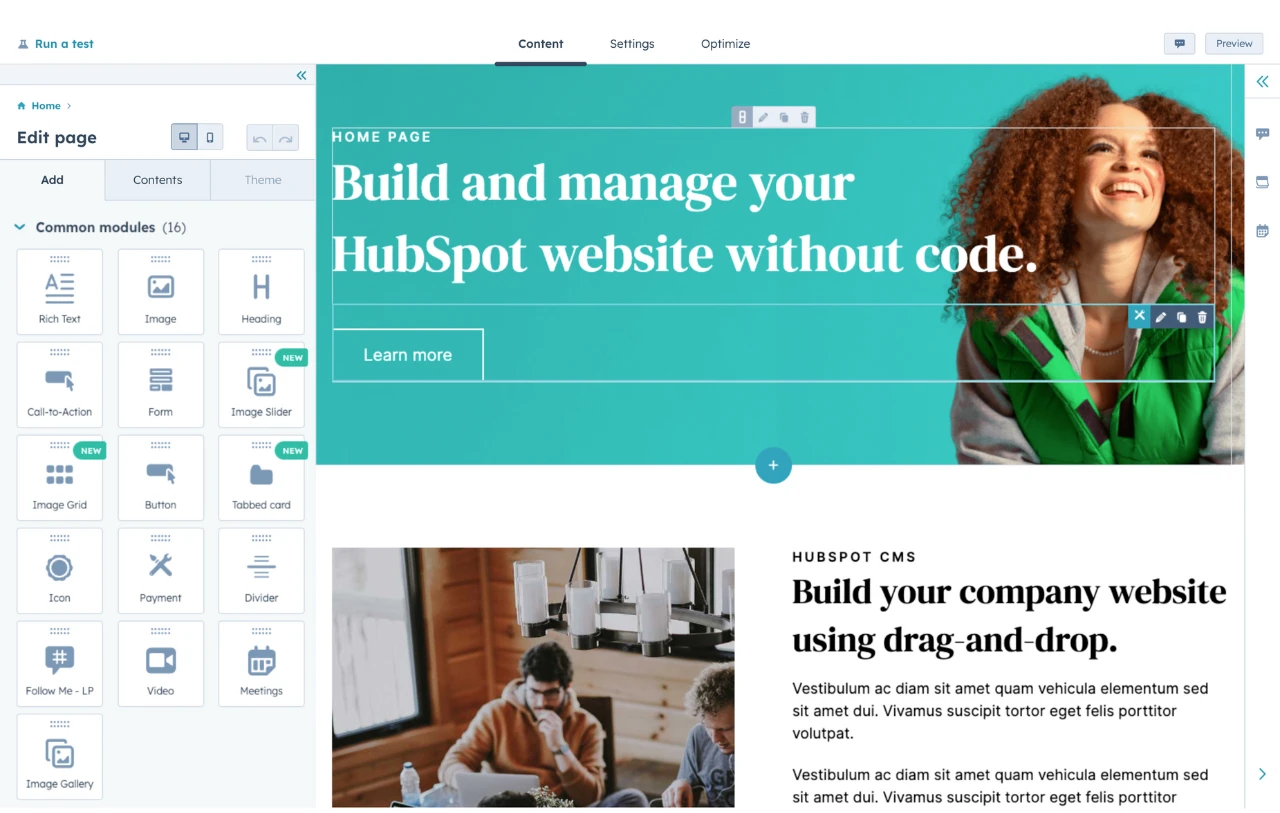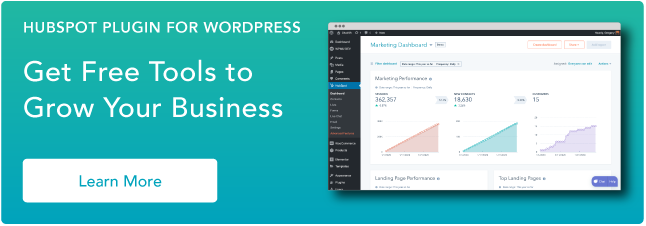What does all of this mean for your business? Well, it’s not enough to simply build an ecommerce website. Rather, you need to build an ecommerce website and experience that's memorable and delightful if you want to attract qualified leads, drive ongoing interest, and boost conversions.
In this guide, we'll cover everything you need to know about great ecommerce website design to help you do just that. But if you’re in a pinch, jump straight to what you need below.
Ecommerce websites have many of the same requirements as websites that don't include online stores including the need for a hosting provider, content management capabilities, and regular updates.
Meanwhile, some of the features that make ecommerce sites unique include:
- Product and pricing pages so your customers can browse, search for, learn about, and identify the products or services you sell.
- On-demand support for visitors to get the help they need while considering whether they want to convert. Today, ecommerce sites typically have multiple options for support including live chat, FAQ pages, community forums, and email and phone support.
- Streamlined shopping carts so visitors can, with minimal effort, add items to their carts as well as view and edit their carts.
- Secure payment for customers to safely enter credit card, shipping, and billing details to complete their purchases (many hosting providers now offer SSL encryption and HTTPS protection to ensure transmitted data is secure, too).
Simply put, potential and current customers should be able to efficiently find everything they need to learn about, evaluate, and purchase your product or service on your site.
With that in mind, let's review some design tips to help you enhance your ecommerce site's look, feel, and UX.
Ecommerce Website Design
To ensure your ecommerce website delivers exactly what it needs for your visitors, follow these four design principles.
1. Create compelling content.
Compelling stories are critical when trying to capture the interest of your target audience. This can include well-written content that incorporates your brand's message while highlighting the features of your product or service. It can potentially help you stand out among your competitors and ensure your ecommerce site's content is memorable.
2. Implement a beautiful and consistent design.
In addition to compelling content, implement a beautiful and consistent design throughout your ecommerce site. Think about your colors, fonts, and page layouts throughout your website, especially on pricing, product, and checkout pages.
Remember, design consistency is key here (similar to the importance of consistency throughout all of your marketing efforts). Pre-made templates from popular ecommerce website builders (which we'll cover in the next section) can help ensure your design complements your delivery and brand.
3. Maintain a clear website structure.
A clear site structure is integral to the success of your ecommerce business. If users can’t immediately find what they’re looking for, they'll most likely abandon your site. To avoid this outcome, implement clean and streamlined navigation so visitors can easily view site pages, their shopping carts, customer support offerings, and more.
4. Focus on search engine optimization (SEO).
All websites today, ecommerce or not, should be search engine optimized. This means your site is enhanced in a way that makes it more likely to appear at the top of the search engine results page (SERP) for words, phrases, concepts, and content that you specialize in. This helps boost your organic traffic, brand recognition and awareness, conversions, and more.
Now that you know the elements you should consider when building your website, let’s take a look at the best builders we know.
If you’re looking for a website builder, you have many options. Here’s a look at some of the most popular ecommerce website builders:
1. Content Hub
Pricing: Starter Plan; $23/month, Professional Plan; $360/month, Enterprise Plan; $1,200/month
Our Content Hub software system is flexible for marketers, powerful for developers, and gives your customers a personalized, secure experience in managing the site of your dreams. Users can choose to integrate any of our well-trusted and effective ecommerce apps — with 50 to choose from.
What We Like: Content Hub features contact attribution reporting to better analyze the impact of your website and get down to the specific content types and sources that drive the most leads to your business.
2. WooCommerce Ecommerce Website Builder
Pricing: Free

If you’re already running a WordPress site and don’t love the thought of starting over, WooCommerce can help. This ecommerce plugin lets you design and deploy great themes and templates and offers a host of extensions — such as HubSpot’s WooCommerce integration for marketing automation, CRM, abandoned cart, and more.
WooCommerce is also highly extendable. There are dozens of plugins you can download in addition to WooCommerce to add advanced, customizable modules and upgrade your store beyond a plain WooCommerce site. For example, if you want to add functionality like wishlists, product comparisons, variation swatches, product badges, and visual editing, you can try a plugin like ShopEngine — it’s a suite of WooCommerce addons to power-up your store.
The best part? WooCommerce is a plugin that can be added to your site for free.
What We Like: With WooCommerce, users can add unlimited amounts of inventory, images, galleries and products to their online store — a great tool for scaling businesses.
3. Shopify Ecommerce Website Builder
Pricing: Basic Plan; $29/month, Shopify Plan; $$79/month, Advanced Plan; $299/month

One of the most commonly used ecommerce website builders is Shopify. With tools to help you choose the right business name and the ability to register domains to a single dashboard for managing your online orders, Shopify has you covered. In addition, Shopify will help business owners track and monitor customer profiles to identify the best buyer personas to sell to.
What We Like: Shopify has features that can reel customers back in, like its Abandoned Cart Recovery. This way, users can easily nudge prospective customers to purchase.
4. Wix Ecommerce Website Builder
Pricing: Free Basic Plan, Unlimited Plan; $14/month

Wix is an all-in-one ecommerce website builder that lets you fully customize your site, create a responsive design, and add advanced features to your site including blogs and online booking tools.
What We Like: Wix can help businesses of specific niches, like fashion, source products with print-on-demand design services, or dropship products directly from its interface.
5. Pixpa Online Store Builder
Pricing: Basic Plan; $6/month, Creator Plan; $12/month, Professional Plan; $18/month, Advanced Plan; $25/month
Pixpa is an all-in-one website builder that serves as an excellent choice for building an online store. Whether you're a small business owner, an artist, photographer or a creative entrepreneur, Pixpa provides the essential tools and features to create and manage your e-commerce website effectively.
What We Like: Pixpa does not charge any commission or listing fees on your sales. For creative professionals, you can sell your products, services, and digital files. Photographers can also sell images as prints and downloads. They also support popular payment gateways and provide robust order and inventory management features to streamline your sales process.
6. Squarespace Ecommerce Website Builder
Pricing: Personal Plan; $14/month, Business Plan; $23/month, Basic Commerce Plan; $27/month, Advanced Commerce Plan; $49/month

Squarespace makes it easy to look like an expert from the beginning. Simply choose a template, start a free trial, and get building — use powerful CMS tools to add your text, logo, and photos. Then choose from hundreds of fonts, colors, and stock images to design your site.
What We Like: Squarespace goes beyond typical online store builders as it allows customers to book services and appointments. It’s more common for ecommerce website builders to only cater to product selling, but Squarespace does both seamlessly.
7. Weebly Ecommerce Website Builder
Pricing: Free Basic Plan, Personal Plan; $6/month, Professional Plan; $12/month, Performance Plan; $26/month

Building with Weebly starts with step-by-step guidance on creating and launching your website. Then, customize your site with Weebly’s free website builder — deploy shipping, payment, and inventory management tools to make your life easier. You can also feature customer reviews to showcase what sets your site apart.
What We Like: One of Weebly’s site-building capabilities includes powerful filtered product search. For businesses with a large array of products, customers can navigate with ease for specific attributes like price, color, size, and more.
8. Hostinger Ecommerce Website Builder
Pricing: Website Plan; $2.90/month, Business Plan; $4.90/month, Online Store Plan; $8.90/month, Advanced Store Plan; $15.90/month

Hostinger lets you create a personal business site with very little hassle. You can build attractive ecommerce pages with simplified workflow features like automatic tools to make shipping, delivery, and tax easy. Hostinger removes much of the need for professional assistance and empowers small business owners to do it themselves.
What We Like: Hostinger has an AI Writer feature, otherwise known as a copy generator. Users can have unique, professional text on their website that is already SEO optimized to help your brand visibility.
9. GoDaddy Ecommerce Website Builder
Pricing: Basic Plan; $29/month, Shopify Plan; $$79/month, Advanced Plan; $299/month

GoDaddy has a beginner-friendly ecommerce website builder that uses Artificial Design Intelligence (ADI) to make creating your website easy and fast. Users can input information about their business into GoDaddy to create a customized site format and design in a matter of minutes, making it perfect for those who want to publish a simple site online quickly.
What We Like: GoDaddy allows business owners to list their inventory on third-party retailer sites like Amazon, Walmart, and eBay to reach more potential customers.
10. Volusion Ecommerce Website Builder
Pricing: Personal Plan; $29/month, Professional Plan; $79/month, Business Plan $299/month

Volusion is an all-in-one online selling platform that lets you create, manage and expand your store with ease. This ecommerce website builder has an intuitive, rich content editor tool that lets you make changes to your online store in a matter of minutes with no backend coding necessary — a huge perk for businesses of any scale.
What We Like: Volusion offers unique features like product video options. This allows potential customers to see product demonstrations or gain a better understanding of the look and feel of the item sold.
11. Shift2Shop Ecommerce Website Builder
Pricing: Free

Shift4Shop makes it easy to build the perfect website for your business and start selling your products or services online. It’s a customizable, feature-rich website builder that allows businesses easy product and order management, customer marketing tools, SEO, and sales tracking capabilities.
What We Like: The platform's free End-to-End plan (only available for U.S. merchants) allows businesses to run a fully functional website while only paying credit card processing fees — as opposed to other builders that charge commission.
12. Duda Ecommerce Website Builder
Pricing: Standar Plan; $7.25/month, Advanced Plan; $19.25/month, Unlimited Plan; $39/month

No tech skills are required to build an impressive ecommerce website with Duda. This platform is a drag-and-drop builder where businesses can build off of various templates for the specific niche represented. Duda equips users with effective SEO, 40+ payment providers, and mobile-friendly experience capabilities.
What We Like: Duda makes it easy to trigger pop-ups, videos, promotions, special messages, and more for users based on various factors, such as location or number of visits to the site. These are effective ways to connect with your audience and boost engagement.
13. Divi
Pricing: $89/year (Divi Pro: $277/year)
Divi is a powerful WordPress website builder that allows you to customize every aspect of your WooCommerce website through its intuitive visual drag-and-drop builder. You can customize everything from product pages and category layouts to checkout flows and cart designs without writing a single line of code, creating a seamless shopping experience that truly represents your brand.
While not exclusively designed for e-commerce, Divi's advanced display conditions allow you to create personalized shopping experiences by dynamically showing or hiding content based on user behavior, browsing history, and custom criteria.
Divi also comes with a built-in A/B testing functionality. This helps you as a store owner to test different product page designs, promotional banners, and calls to action to discover what truly resonates with your customers and drives conversions.
Divi has its own AI assistant, called Divi AI. Apart from creating an entire website in under 2 minutes, it can be a real asset to e-commerce store owners by helping them refine and optimize their product descriptions and create multiple content variations for split testing. This powerful tool enables you to continuously refine your messaging and improve conversion rates through data-driven insights.
What We Like: Divi combines a powerful website builder with advanced marketing features. With the upcoming Divi 5 release, It is a powerful tool for store owners.
Build Your Ecommerce Website
The right ecommerce website makes all the difference in driving customer interest and conversions. Achieve a delightful ecommerce experience for visitors by using the tips we covered above as well as applying one of the ecommerce site builders we reviewed to help you along the way.
Editor's note: This post was originally published in March 2020 and has been updated for comprehensiveness.
Ecommerce











.jpeg)

